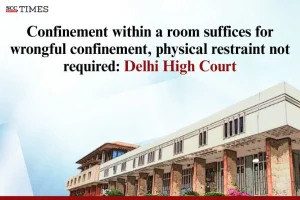Delhi High Court: In a criminal revision petition filed by the State against the Trial Court order dated 10-10-2017 discharging the accused persons for offence under Sections 323 and 342 of the Penal Code, 1860 (‘IPC’) a Single Judge Bench of Girish Kathpalia J., held that, for the offence of wrongful confinement, it is not necessary that the victim must be physically immobilized, such as by tying their hands. Confinement within a room, as alleged in the present case, is sufficient to constitute a prima facie case for framing a charge under Section 342 of the IPC.
Further, the Court stated that merely because the Medico Legal Case (‘MLC’) of the prosecutrix did not reflect any injuries, her clear statement that she was beaten up could not be discarded. Accordingly, the Court allowed the petition and set aside the order discharging the accused persons for offence under Sections 323, 342 read with Section 34 of the IPC.
Background:
The prosecutrix had studied till 5th standard and was working as a receptionist in a company owned by the accused1. The wife of accused 1 (accused 2), also worked in the same company. The accused entrapped the prosecutrix with his sweet talk and convinced her that he would marry her after divorcing his wife. Believing this, the prosecutrix entered into a physical relationship with the accused on multiple occasions.
On 27-7-2016, the prosecutrix went to the accused’s house to discuss her marriage with him. There, both the accused persons allegedly beat her and confined her in their house. They also threatened to get her booked in a false case. Afterwards, they called the Police Control Room, and all of them were taken to the police station.
At the police station, based on prosecutrix’s statement, a First Information Report (‘FIR’) was registered for offence under Section 376 read with Section 377 of the IPC. After investigation, the local police filed a chargesheet against the accused persons for offences under Sections 376, 377, 323, 342, read with Section 34 of the IPC, as well as Section 6 of The Protection of Children from Sexual Offences Act, 2012 (‘POCSO Act’).
The Trial Court, in the impugned order, held that charges for offence under Section 376(2) and 377 of the IPC and Section 6 of the POCSO Act were made out against the accused 1. However, the Trial Court found that no offence was made out against accused 2. Therefore, the present revision petition was filed, challenging the discharge of the accused persons for offences under Sections 323 and 342 of the IPC.
Analysis, law and Decision
The Court noted that the Trial Court had taken the view that, since MLC of the prosecutrix did not mention any injury, a charge for offence under Section 323 IPC could not be framed. Regarding the charge for offence under Section 342 IPC, the Trial Court took the view that since there was no averment in the FIR that the accused persons had tied up hands of the prosecutrix, there was no confinement.
However, the Court did not agree to the view of Trial Court and clarified that the court cannot minutely analyse the material placed on record by the prosecution at the stage of framing charges. The Court emphasised that only prima facie case had to be kept in mind and if there exists agrave suspicion against the accused, charge must be framed accordingly.
Further, the Court emphasised that merely because the MLC of the prosecutrix did not reflect injuries, the explicit statement of the prosecutrix that she was beaten up could not be discarded. As regards the wrongful confinement, there was an explicit statement of the prosecutrix in the FIR: “I was confined by him in his house”. The Court explained that for wrongful confinement, it was not necessary that the victim must be immobilized by tying her hands. Confinement within a room would also be sufficient to make out a prima facie case for framing charge for offence under Section 342 IPC.
The Court noted that the statement of the prosecutrix in the FIR was clear and specific, stating that both accused persons had wrongfully confined and voluntarily hurt by beating, with a common intention. The Court added that the expression “common intention” need not be explicitly stated and the same had to be inferred from the statement.
The Court allowed the revision petition and after setting aside the impugned order , remanded the matter to the Trial Court to decide afresh on these aspects.
[State (NCT of Delhi) v. Mukesh, 2025 SCC OnLine Del 4974, decided on 18-7-2025]
Advocates who appeared in this case:
For the Petitioner: Amit Ahlawat, Additional Public Prosecutor


